By: Robert Avsec, Executive Fire Officer
They said the lessons learned from the devastation of Hurricane Andrew (1992) wrought on South Florida would 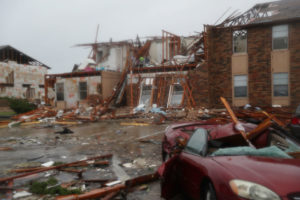 resonate in the emergency management community for generations. Those lessons didn’t even last one generation (20 years) when Hurricane Katrina (2005) roared ashore 13-years later and forever altered the U.S. Gulf Coast region, particularly Mississippi and the City of New Orleans.
resonate in the emergency management community for generations. Those lessons didn’t even last one generation (20 years) when Hurricane Katrina (2005) roared ashore 13-years later and forever altered the U.S. Gulf Coast region, particularly Mississippi and the City of New Orleans.
And now we have the ongoing catastrophe that is Hurricane Harvey, a Category 4 hurricane that made landfall on the Texas Gulf Coast this past Friday. And which continues to dump rainfall of biblical proportions on Houston and its surrounding regions; some areas may receive 40 inches of rain before it’s all over in a region that’s not all that high above sea level to begin with.
It’s the Same Song
Once again, we’re seeing massive numbers of people being rescued from neck-high-deep water, from the rooftops of homes, and tens of thousands of people being housed in emergency shelters. And yet again, we’ve seen what happens when state and local governments send ambiguous and conflicting messages to the general public regarding emergency evacuations.
The governor of Texas told people to get out. The mayor of Houston said stay put. Some mandatory evacuations
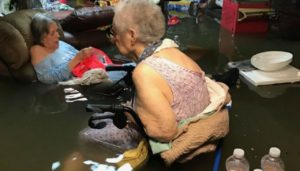
Residents of a Houston-area nursing home await rescue in deep water inside the facility.
were ordered along with some voluntary evacuations. One local sheriff went so far as to tell people in his community to use a Sharpie (permanent ink) marker to put their Social Security number on their arms so that they might be more easily identified after the storm.
When will we as a society come to grips with the cold, hard fact that the only way to protect lives in coastal regions in the face of a major hurricane is for people to quickly move to higher ground before the storm makes landfall? And I’m not just speaking of civilian lives. I’m also speaking of the firefighters, law enforcement officers, and EMS personnel who risk their lives working themselves into a state of exhaustion conducting search and rescue operations during and after the storm in the most hazardous of conditions. Looking for, and rescuing people didn’t get out when the getting was good!
Yes, I know that the catastrophe is on-going and that those brave men and women of public safety, along with the 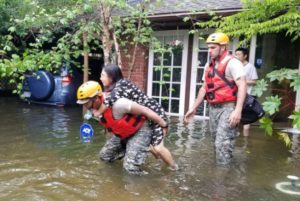 Coast Guard and other resources coming into the area, are still hard at work. Some will say that we should wait to start making judgements about what went wrong and what needs to change. The politicians will say things like, “There will be plenty of time to thoroughly evaluate what happened. Right now, everyone should be focused on helping those in need and working to restore a sense of normalcy in those communities.”
Coast Guard and other resources coming into the area, are still hard at work. Some will say that we should wait to start making judgements about what went wrong and what needs to change. The politicians will say things like, “There will be plenty of time to thoroughly evaluate what happened. Right now, everyone should be focused on helping those in need and working to restore a sense of normalcy in those communities.”
But see, the thing is that people are only “listening” when they’re still seeing photos and videos of the devastation and human suffering coming out of Texas. Months from now, when those evaluations are completed and the reports written, the information and recommendations will fall upon “deaf ears”. Such news will be on page 14 of the newspapers and will only get a 20-second mention on the evening news.
We’ve already got a pretty good idea of what didn’t happen
State and local government officials rely too much on people having the common sense to make the correct 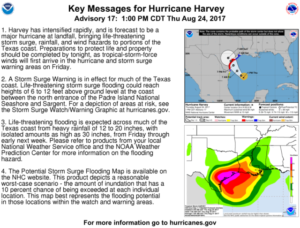 evacuation decision. I’m sure that emergency management people in the region had developed all sorts of emergency operations plans because that’s what they do, and they do it well. But the best plans are worthless unless the responsible elected officials—the only people who can put real “teeth” into the implementation of any plan—have the courage to “make the right call” on mandatory civilian evacuations.
evacuation decision. I’m sure that emergency management people in the region had developed all sorts of emergency operations plans because that’s what they do, and they do it well. But the best plans are worthless unless the responsible elected officials—the only people who can put real “teeth” into the implementation of any plan—have the courage to “make the right call” on mandatory civilian evacuations.
The City of Houston (population of about 2.4 million) must not have a realistic emergency evacuation plan for the efficient and effective evacuation of the city. Why else would the mayor tell people to stay put in the face of a Category 4 hurricane that forecasters were saying (as early as the Tuesday before Harvey’s landfall that the storm was capable of dumping upwards of 40 inches of rain on the city and region?
The people living in the Gulf Coast region of Texas had obviously become complacent about the devastating impact of a hurricane since it had been more than ten years since a major hurricane had made landfall in the region. Why else would they wait for the local and state government to tell them what to do?
Plan Ahead for Disasters
It couldn’t have been that they didn’t know what was coming. Hurricane forecasting is better than ever before and people had several days’ worth of the information upon which to act (My Facebook and Twitter accounts were “blowing up” with posts about Hurricane Harvey and how bad a storm Harvey was going to be).
Voluntary evacuation orders are worthless. Given a choice, history has shown that too many people make the wrong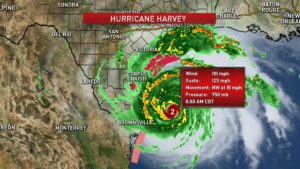 decision to stay put in the face of a major hurricane. Voluntary evacuation orders also “miss” a significant number of people in a community; those without Internet access or television service, particularly the homeless, are not privy to the same level of information. They don’t get the word.
decision to stay put in the face of a major hurricane. Voluntary evacuation orders also “miss” a significant number of people in a community; those without Internet access or television service, particularly the homeless, are not privy to the same level of information. They don’t get the word.
Mandatory evacuation orders must be that: Mandatory. And those orders must be enforceable by local law enforcement. Get out or get arrested. How many times have we seen people who’ve ignored mandatory evacuation orders, only to become victims in need of rescue?
A former boss of mine once said, “Common sense is required. Unfortunately, it’s not a prerequisite.” Isn’t it past the time for us to learn lessons from events like Harvey, only to forget those lessons learned when the next major hurricane bears down on the U.S.?
See Related: Storms, Public Safety, and Social Media
 Fire & EMS Leader Pro The job of old firefighters is to teach young firefighters how to become old firefighters!
Fire & EMS Leader Pro The job of old firefighters is to teach young firefighters how to become old firefighters!